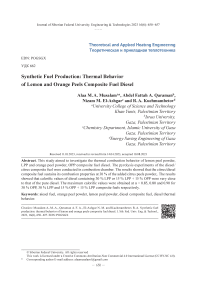Synthetic fuel production: thermal behavior of lemon and orange peels composite fuel diesel
Автор: Musalam A.M.A., Qaraman A.F.A., El-ashgar N.M., Kuchmambetov R.A.
Журнал: Журнал Сибирского федерального университета. Серия: Техника и технологии @technologies-sfu
Рубрика: Исследования. Проектирование. Опыт эксплуатации
Статья в выпуске: 6 т.16, 2023 года.
Бесплатный доступ
This study aimed to investigate the thermal combustion behavior of lemon peel powder, LPP and orange peel powder, OPP composite fuel diesel. The pyrolysis experiments of the diesel/ citrus composite fuel were conducted in combustion chamber. The results showed that the citrus/diesel composite fuel sustains its combustion properties at 30 % of the added citrus peels powder,. The results showed that calorific values of diesel containing 30 % LPP or 15 % LPP + 15 % OPP were very close to that of the pure diesel. The maximum calorific values were obtained at α = 0.85, 0.80 and 0.90 for 30 % OPP, 30 % LPP and 15 % OPP + 15 % LPP composite fuels respectively.
Diesel fuel, orange peel powder, lemon peel powder, diesel composite fuel, diesel thermal behavior
Короткий адрес: https://sciup.org/146282714
IDR: 146282714 | УДК: 662
Текст научной статьи Synthetic fuel production: thermal behavior of lemon and orange peels composite fuel diesel
Цитирование: Мусалам А. М. А. Композитное дизельное топливо: термическое поведение лимонных и апельсиновых корок в дизельном композите / А. М. А. Мусалам, А. Ф. А. Караман, Н. М. Эль-Ашгар, Р. А. Кучмамбетов // Журн. Сиб. федер. ун- та. Техника и технологии, 2023, 16(6). С. 650–657. EDN: POGSGX used in countries that do not produce petroleum oil, such as Palestine. Many valuable researches studied the composite fuel with solid material such as coal powder in liquid fuels. The composite fuel was prepared and pumped into diesel engines, and it gave an acceptable thermal efficiency [6, 3, 5].
Other studies used the residues of oil pressing waste, such as olive waste, to produce a composite fuel used in different thermal fields, after comparing the thermal behavior of such composite fuels with the thermal behavior of diesel, this led to obtaining a composition of the composite fuel closer to diesel fuel [7, 8].
Vegetable oils were used as composite fuels to diesel in diesel car engines, but they need heat treatments and the addition of active materials to increase their efficiency and reduce their viscosity. The oils used were sunflower oils, cottonseed oils, and soybean oils [9, 10, 11].
Orange peel powder used as a composite fuel with diesel in combustion engines, the results showed that by mixing 30 % of orange peel powder with diesel at a pressure of 235 bar gave the best performance and lower emissions in CO and HC [12, 5].
The main chemical composition of citrus peels are phenols, sugars alkaloids, saponins, terpenes, resins, flavonoids and tannins in addition to some trace metals [5].
In Gaza Strip, the cultivated area of the citrus crop reached 20,000 agricultural dunums, with a production of 35,000 tons for the agricultural season 2019/2020 [13].
Gaza Strip has been suffering from many crises since 2007 in the field of energy and the production of electric power, due to the lack of fuel, especially since Palestine does not produce oil or fossil fuel sources. Also Palestinian areas faced more severe economic circumstances as a result of the war in Ukraine, particularly when prices for petroleum goods rose. Fig. 1 illustrates the increase in diesel costs brought on by the conflict between Ukraine and Russia [14].
The study attempts to investigate a suitable composite fuel composition consisting of citrus peel powder, which is abundantly available in the Gaza Strip, such as oranges and lemons, by mixing it with diesel, then studying the thermal properties of this composite fuel and compare it with the thermal properties of 100 % diesel through the combustion processes under combustion pressure as well as the combustion under the atmospheric pressure.
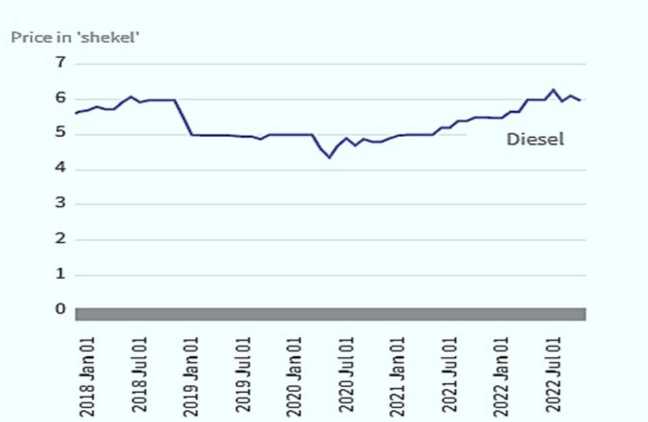
Fig. 1. Historical Fuel Prices in Palestinian territories
Materials and Methods
The peels of citrus fruits which included oranges and lemons were collected as residuals from domestic use in the Gaza Strip. Diesel with heat of combustion 4.01×104kJ /kg was brought from local fuel stations. Alkyl phenol ethoxylate (APE) were supplied from Merck. Ethanol 95 % and carboxymethyl cellulose (CMC) were purchased from Merck.
Citrus peels were well dried under sunlight at a temperature of 27 °C after washing with distilled water. The dry peels were crushed and ground using a mill and then sieved to obtain a powder of particle size in the range 450–750µm size. Different percentages of lemon and orange peels powder (10–30 %) by mass of total fuel composite were mixed with diesel with and without additives. The additives used were 0.05 % alkylphenol ethoxylate (APE), 2.0 % carboxymethyl cellulose (CMC) and 3.0 % of ethanol (95 %). APE additive is a nonionic surfactant used as homogenizing, emulsifiers and solubilizer CMC is used as an activator, while ethanol is used as a solubilizer. The samples were preserved for 10 days under room temperature before the pyrolysis experiments.
Results and Discussion
Table 1 shows a comparison between the physical properties of the pure and composite diesel that prepared by mixing with certain percentages of orange peels powder (OPP) or/and lemon peels powder (LPP).
From Table 1 it is observed that calorific values of 30 % LPP/diesel composite and 15 % LPP+ 15 % OPP/diesel composites are very close to the pure diesel calorific value compared with 30 % OPP/ diesel composites. This indicates that LPP gives similar calorific properties to diesel fuel and it could be used in diesel as an efficient fuel composite.
It is obvious that the flash points of the composite fuels are higher than that of the pure diesel which attributed to presence of the peels particles which affect the rate of evaporation of diesel. The results show that the density of the three composite citrus fuels is higher than that of pure diesel fuel due to the compact properties of the solid citrus particles. The composite fuels show slightly lower cetane number than that of pure diesel fuel which indicate that the effect of the addition of citrus powder to the diesel fuel did not lead to a significant effect on the fuel efficiency and could be used as soft additives to the diesel without diminishing the fuel performance.
Fig. 2 shows a comparison between the thermal behaviors of diesel mixed with orange peel powder, OPP (composite fuel) at different per-centages ranging between (0–40 %). From Fig. 2. It’s clear that when the percentage of OPP increases in the composite fuel, the thermal behavior moved
Table 1. Comparison of the physical properties of the pure diesel and the composite diesel
|
15 %LPP+15 %OPP/diesel |
30 % LPP/diesel |
30 %OPP/diesel |
Pure diesel |
Physical property |
|
41.58 |
43.47 |
39.34 |
45 |
Calorific Value kJ/kg |
|
70 |
67 |
75 |
53 |
Flash point, C |
|
875 |
875 |
875 |
860 |
Density, kg/m3 |
|
47 |
47 |
47 |
49 |
Cetane Number |
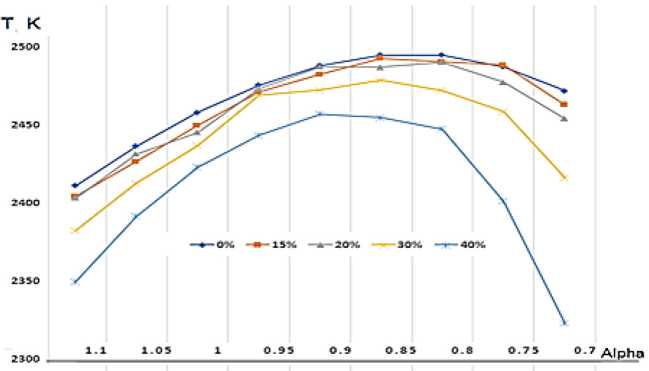
Fig. 2. Thermal behaviour of composite diesel fuel at different percentage of OPP away from the behavior of pure diesel. The thermal behavior of the com-posite fuel at 15 %, 20 %, and 30 % of OPP in the composite fuel converges at alpha between (0.85–1.0). The study showed that 30 % of OPP in the composite fuel at a pressure of 235 bar gave the best results and reduces the harmful emissions, and almost matches with that of pure diesel, and it reached a maximum value at alpha 0.85. It is also clear from Figure 2 that the thermal behavior increases with an increase of temperature (T) until reaches the maximum alpha value at about 0.85 then starts decreasing. This result is consistent with that given by [12, 15].
Equation 1 shows the ratio of mixing air mass with a mass of fuel in the combustion chambers so that the mixing ratios range from 0.7 to 1.1 and the increase is in the direction of the air mass. Alpha is a coefficient incompletion air:
Alpha = Gair / Gfuel*af (1)
where: Gair: air mass, Gfuel: fuel mass and af = 1 the amount of air in kg needed to complete burning of 1kg diesel like fuel” [16].
Fig. 2 shows a comparison between the thermal behavior of pure diesel (0 % LPP) and the composite fuel of diesel where the pure diesel was mixed with lemon peel powder (LPP) at percent ranging between 15–40 %. The thermal behavior of composite fuel at 30 %, 20 %, and 15 % LPP converges at α between (0.8–1.0).
From Fig. 3, we notice that the composite fuel at 30 % LPP has the best thermal behavior and is close to pure diesel at alpha 0.8.
It is clear from Fig. 2 and Fig. 3, that the ther-mal behavior of citrus peel powder diesel composites (lemon and orange) is similar.
Fig. 4 shows the thermal behavior of composite fuel composed of OPP with LPP in different proportions up to 30 % with diesel. It is noticeable from Fig. 4 that the composite fuel of the percent mixture of 15 % OPP and 15 % LPP in diesel gives the best thermal be-havior compared to other percentages at all alpha values. It is clear that the composite fuel OPP + LPP at all percentages mixture of the composite fuel has the maximum thermal be-havior at alpha 0.9.
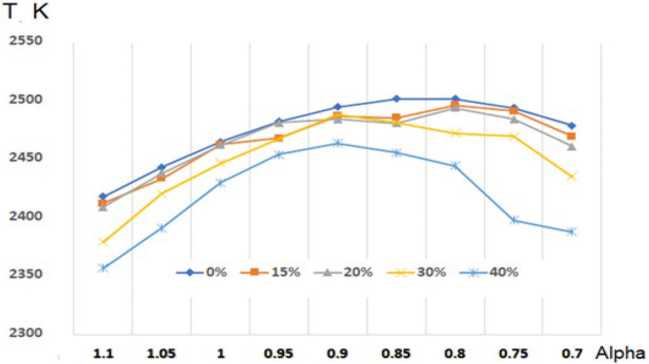
Fig. 3. Thermal behavior of composite diesel fuel at different percentage of LPP
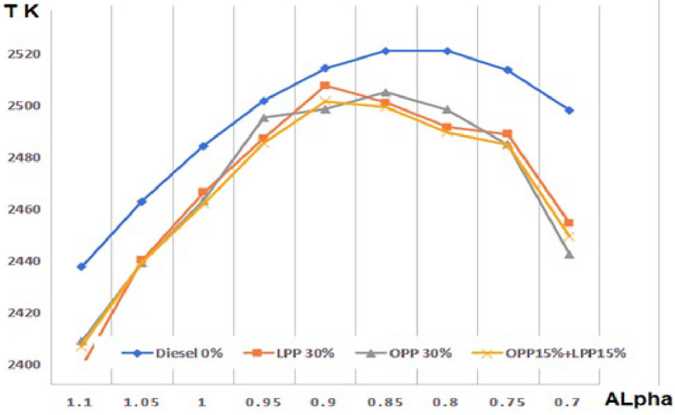
Fig. 4. The thermal behaviour of composite fuels at different ratios of orange and lemon peels powder with diesel
Fig. 5 shows that all citrus peel powders com-posite fuels are close to each other, at alpha 0.9. The composite fuel 30 % LPP has slightly best thermal behavior which is closer to pure diesel, followed by 15 % LPP + 15 % OPP where it was near to 30 % OPP.
Fig. 6 shows the three phases of the composite fuel (15 % OPP and 15 % LPP) with diesel without additives (at atmospheric pressure). It can be noted from Fig. 6 that the highest combustion point was in the second phase after 35 seconds, where the maximum combustion temperature reached ~600 °C which is comparable with the citrus peel combustion temperature.
Fig. 7 shows the three phases of the composite fuel 15 % OPP +15 % LPP with diesel with additives, it is observed that the highest combustion point was in the second phase after 30 seconds, where the maximum combustion temperature reached 800 °C.
Comparing this result with the combustion of 15 % OPP +15 % LPP with diesel without additives (Fig. 6) where it was at 600 °C, it can be seen that adding homogenizing and combustion activators to the composite fuel rose the temperature of combustion by about 200 °C.
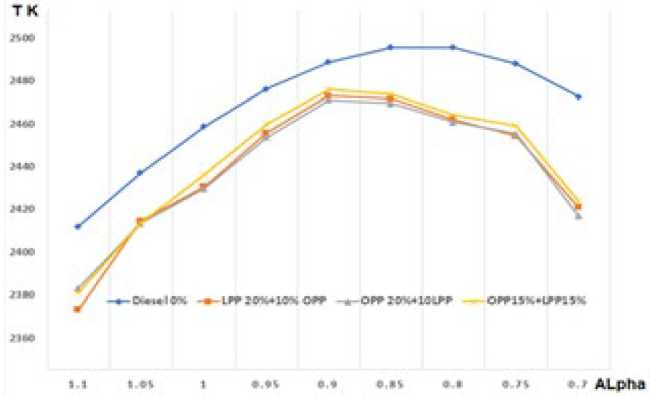
Fig. 5. Thermal behavior of different Citrus Peel Powders composite fuel and pure diesel
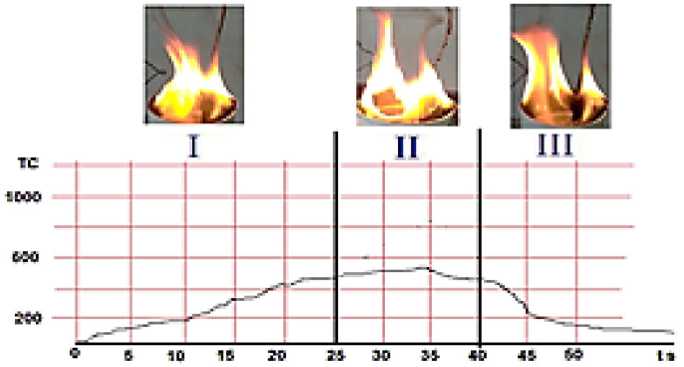
Fig. 6. The three phases of the composite fuel, 15 % OPP +15 % LPP with diesel
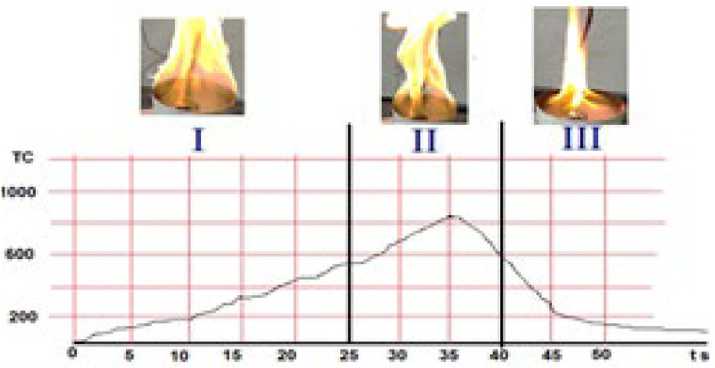
Fig. 7. The three phases of the composite fuel 15 % OPP +15 % LPP with additives
Conclusion
Lemon and orange peels powder composites diesel fuel with variable percentages were prepared and tested for pyrolytic combustion and compared with pure diesel under combustion pressure as well as the combustion under the atmospheric. The optimized content of powder/diesel composite was 30 % LPP/diesel, 30 % OPP/diesel and 15 % LPP + 15 % OPP/diesel where highest calorific values were obtained with a reduction of harmful emissions. The thermal behavior of the composite fuel increases with increasing temperature of combustion and reached maximum value at α = 0.85, 0.8 and 0.9 for 30 % LPP/diesel, 30 % OPP/diesel and 15 % LPP + 15 % OPP/diesel respectively. The thermal – 656 – behavior of the composite fuels containing homogenization material were more efficient than that without additives as the combustion temperature elevated by 230 °C, 200 °C and 330 °C for 30 % OPP, 30 % LPP and 15 % OPP + 15 % LPP respectively.
Список литературы Synthetic fuel production: thermal behavior of lemon and orange peels composite fuel diesel
- Marshall R. E. and Farahbakhsh K. Systems approaches to integrated solid waste management in developing countries. Waste management, 2013, 33(4).
- Santos, Carolina Monteiro et al. Application of orange peel waste in the production of solid biofuels and biosorbents. Bioresource Technology, 2015, Vol. 196.
- Alaa M. Musalam and Abdel Fattah A. Qaraman. The thermal behavior of the coal-water fuel (CWF). International Journal of Energy and Environmental Research, 2016, Vol. 4(3), pp 27-36.
- Kok Mustafa Versan and Emre Ozgur. Thermal analysis and kinetics of biomass samples. Fuel Processing Technology, 2013, Vol. 106.
- Reddy M. H., Rohith M. and Vinay P. The effect of orange peel powder extracts in diesel solution on exhaust gas emissions in compression ignition engine. Int J Mech Prod Eng, 2013.
- Wamankar, Arun Kumar and Murugan S. Review on production, characterisation and utilisation of solid fuels in diesel engines. Renewable and Sustainable Energy Reviews, 2015, Vol. 51.
- Qaynak S., Guru M., Biger A., Keskin A. and Igingur Y. Biodiesel production from pomace oil and improvement of its properties with synthetic manganese additive. Fuel, 2009, Vol. 88.
- Musalam A. M., Qaraman A. F.A. and El-Hassayna I. M. Thermal Properties of Pomace Olives in a Composite Mixture. IUG Journal of Natural Studies, 2017, Vol. 25.
- Altin R., Cetinkaya S. and Yucesu H. S. The potential of using vegetable oil fuels as fuel for diesel engines. Energy conversion and management, 2001. Vol. 42.
- Murayama T., Fujiwara Y. and Noto T. Evaluating waste vegetable oils as a diesel fuel. Proceedings of the Institution of Mechanical Engineers, Part D: Journal of Automobile Engineering, 2000, Vol. 214.
- Musalam A. Minimize environmental pollution due to the use of vegetable oil as an alternative fuels in diesel engine.. An - Najah Univ. J. Res. (N. Sc.), 2014, Vol. 28.
- Purushothaman K. and Nagarajan G. Studies on a CI engine using orange skin powder diesel solution with different fuel nozzle opening pressure. Thermal Science, 2009, Vol.13.
- Alray. Agriculture in Gaza: 2020 is the year for the advancement of the agricultural sector, https://alray.ps/ar/post/214553. (Accessed 15-04-2021) 2020.
- Fuel price. 2022. Fuel prices in Palestine, https://www.thefuelprice.com/Fps/en. (Accessed 30-10-2022).
- Pathak P. D., Mandavgane S. A. and Kulkarni B. D. Fruit peel waste: characterization and its potential uses. Current Science, 2017.
- Musalam A. Improvement of technology of burning composite fuel in combustion chambers of the heat power plants. Unpublished PhD Thesis. National Aerospace University of Ukraine. Ukraine, 2004.

